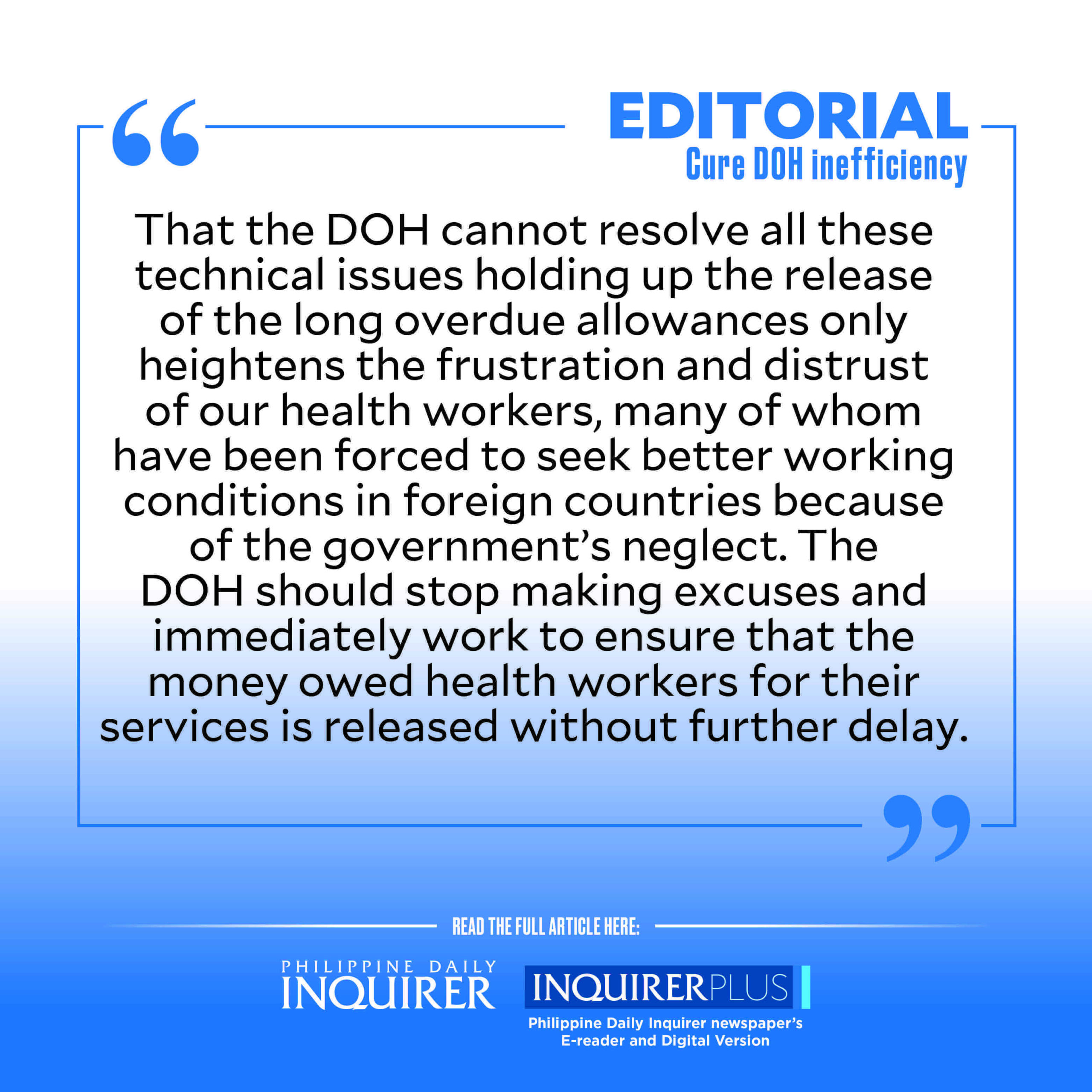Cure DOH inefficiency

It has been 690 days today since the law granting allowances to public and private health-care workers (HCWs) for their service during the COVID-19 pandemic was signed on April 27, 2022. That’s almost two years for the government to get its act together and put money where its mouth is. Yet many of our HCWs have not received their health emergency allowance (HEA) and have been told by government that it may take two more years or until 2026 before the P62 billion owed to about 10 million HCWs is settled in full.
The process to compensate HCWs for their invaluable and crucial role during the COVID-19 pandemic started in Congress in July 2021. Republic Act No. 11712 or the Public Health Emergency Benefits and Allowances for Health Care Workers Act, enacted less than a year later, declares that the state “recognizes the critical role of health care workers … especially in times of national public health emergencies. To this end, the State shall reciprocate by promoting their welfare through the grant of mandatory benefits and allowances with utmost efficiency (emphasis provided).”
A lot of finger-pointing
But how many protests will HCWs need to do for the government to honor its obligation? “Nasaan ang pagkalinga ng [Department of Health] sa aming mga manggagawang pangkalusugan? (Where is the care of the Department of Health (DOH) for HCWs?)” asked one protester at last Thursday’s rally organized by the United Private Hospital Unions of the Philippines in front of the Metro Manila Center for Health and Development office in Mandaluyong City. “Marami sa amin ang nagkanda-baon-baon na sa utang kakahintay sa [HEA] na para sa amin … lagyan n’yo naman ng husay ang inyong mga pagkilos. Bilis-bilisan naman po ninyo. (Many of us are deep in debt waiting for the HEA owed to us … do your job. Be more efficient.)” They have called for the resignation of Health Secretary Teodoro Herbosa for failing to address the issue.
In his confirmation hearing before the Senate in December last year, Herbosa said the DOH had consistently sought funding from the Department of Budget and Management (DBM) for the unpaid HEAs. However this is dependent on the government’s tax collection, Herbosa said, which was low in 2021 and 2022 when businesses were hobbled by the lockdowns at the height of the pandemic, thus, the delay in disbursing the funds. There was also a lot of finger-pointing on which agency was causing the delay, with the DOH blaming hospitals for failing to submit the list of HCWs qualified to receive HEAs.
‘Unprogrammed appropriations’
Budget Undersecretary Goddes Hope Libiran, in a Meta (Facebook) post on March 1, said the DBM has allotted P19.962 billion for HEA under the 2024 budget and the same has been released to the DOH in January, on top of the P2 billion “unprogrammed appropriations” for the same item. She added that the DBM has released P90 billion in total since 2020 to fund HEA. The DOH claimed that it has sub-alloted P18.962 billion to regional offices nationwide while P1 billion has remained with the central office. Libiran said the DOH has committed to establish a HEA mapping to chart how much money has been disbursed and how many HCWs have been paid.
The DOH also committed to the DBM to submit an inventory of all HEA payments and unpaid balances per medical facility. “This is for DBM to determine how much is the actual deficiency under the program. It’s impossible to request additional funding without a final computation or basis … especially when it’s taxpayer money we’re talking about. Once the DOH submits the computation and we can validate and prove that the program needs additional funding, we will look for ways and request additional allocation,” Libiran said in Filipino.
Grievance committee
In his confirmation hearing, Herbosa said that the HEA mapping is already available (https://doh.gov.ph/headashboard/) and that most complaints are coming from HCWs who have not been paid for various reasons including their removal from the official list of recipients or their category has been downgraded from medium to low risk, which will entitle them to a smaller allowance. The department, he said, has set up a grievance committee to address these issues and is also considering remitting the HEA directly to bank accounts of HCWs instead of going through the medical facilities.
That the DOH cannot resolve all these technical issues holding up the release of the long overdue allowances only heightens the frustration and distrust of our health workers, many of whom have been forced to seek better working conditions in foreign countries because of the government’s neglect. The DOH should stop making excuses and immediately work to ensure that the money owed health workers for their services is released without further delay.
Failing that, President Marcos should intervene and whip these agencies into action, or else his own avowed concern for the health workers will be put in doubt.




















